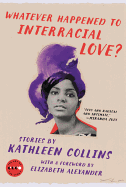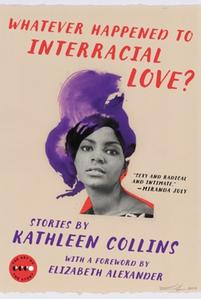
 Kathleen Collins was a writer, civil rights activist, filmmaker and film professor who died at age 46 in 1988. Her daughter inherited her works and personal papers, and in recent years has taken on the project of her mother's legacy. Collins's critically admired feature film, Losing Ground, was restored and given its first theatrical release in 2015. Whatever Happened to Interracial Love? is the first publication of her short fiction.
Kathleen Collins was a writer, civil rights activist, filmmaker and film professor who died at age 46 in 1988. Her daughter inherited her works and personal papers, and in recent years has taken on the project of her mother's legacy. Collins's critically admired feature film, Losing Ground, was restored and given its first theatrical release in 2015. Whatever Happened to Interracial Love? is the first publication of her short fiction.
This collection is filled with nostalgia for lost moments of happiness and belonging--in a romance, in an extraordinary group of young friends or a seemingly perfect family. Collins understands the delicate intricacies of a failing relationship, and a special interest in the unresolvable strangenesses of life. In one story, a hairdresser accidentally and inexplicably tells a client's future; in another, an uncle "soaked his life in sorrow," keeping the household awake every night with "his great heartrending sobbing that went on hour after relentless hour until the morning, when he would fall asleep and sleep the day away only to awaken again at night and begin this vigorous lamentation."
In many of her stories, race and gender conflicts play out in the lives of intellectual and idiosyncratic people living in Manhattan, Paris and rural New England during the early 1960s, when the civil rights movement was roaring. Collins vividly evokes the exhilaration and apprehension of that time, and the struggle to build personal lives in the midst of sexual and racial revolution. Her characters negotiate the joys and irritations of the bohemian social scene, their own evolving ideals and the chilly disapproval of older relatives who see no charm in a literature degree, civil disobedience, natural hair or interracial love. "And what of love instead of politics? What of the nubile, fleeting sensation, when one is color-blind, religion-blind, name-, age-, aid-, vital statistics-blind...? What of all those interracial couples peppering the Lower East Side in the summer of '63 and the summer of '64, only to go into furtive decline in the summer of '65--no longer to be seen holding hands in public ('Black Power! Black Power! Black Power!')?"
These stories fill a gap in the literature, whether or not you knew a gap was there, and they speak to the present like a sharp-eyed worldly aunt who has seen it all before. --Sara Catterall
Shelf Talker: This collection of stories follows young black bohemian intellectuals in the 1960s, as they negotiate life in the midst of sexual and racial revolution.

